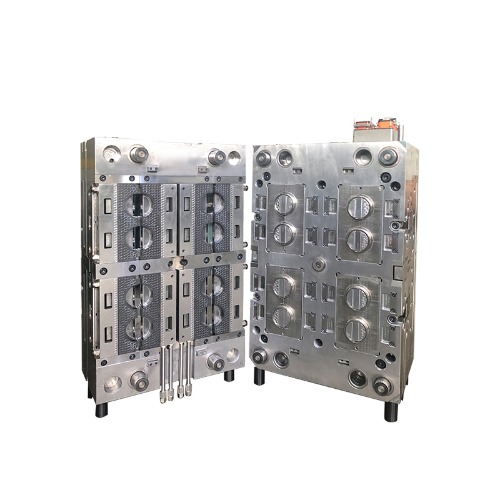Beverage packaging molds, also known as beverage bottle molds, are specifically designed molds used in the manufacturing process of beverage bottles and containers. The structure of a typical beverage packaging mold consists of several key components:
Mold Cavity: The mold cavity is the main part of the mold that creates the shape and size of the beverage bottle. It is the void space where the molten plastic material is injected and solidifies to form the final product. The mold cavity is typically made from hardened steel or aluminum, which provides durability and heat resistance.
Core: The core is a component of the mold that forms the internal shape of the beverage bottle. It is placed inside the mold cavity and defines the internal features of the container, such as the neck, threads, and inner surface. The core is usually removable to facilitate the ejection of the finished product from the mold.
Injection System: The injection system consists of channels, runners, and gates that allow the molten plastic material to flow into the mold cavity. It includes an injection nozzle through which the plastic is injected, a runner system that distributes the plastic throughout the mold, and gates that control the flow of plastic into the mold cavity. The design of the injection system ensures proper filling of the mold and uniform distribution of the plastic material.
Cooling System: The cooling system is integrated into the mold to facilitate the solidification of the molten plastic. It typically consists of cooling channels or passages that circulate a cooling medium, such as water or oil, to extract heat from the mold. The cooling system helps to achieve faster cycle times and maintain the structural integrity of the beverage bottle during the molding process.
Ejection System: The ejection system enables the removal of the finished beverage bottle from the mold once it has solidified. It includes ejector pins or plates that push against the molded product, allowing it to be ejected from the mold cavity. The ejection system is designed to ensure smooth and efficient ejection of the bottles without causing any damage.
Mold Base: The mold base provides structural support for all the components of the mold. It serves as the foundation and houses the mold cavity, core, injection system, cooling system, and ejection system. The mold base is typically made of sturdy materials, such as steel or aluminum, to withstand the pressure and forces exerted during the injection molding process.
Besides,Beverage packaging molds, also known as beverage bottle molds, are used in the manufacturing of various types of beverage bottles and containers. These molds play a crucial role in the production of beverage packaging and are essential in the beverage industry. Here are some key applications of beverage packaging molds:
Bottled Water: Beverage packaging molds are widely used in the production of bottled water. They are responsible for creating the desired shape, size, and features of the water bottles, such as the neck design, threads, and labeling areas. The molds ensure consistent and high-quality production of water bottles in large quantities.
Carbonated Soft Drinks: Molds are used for manufacturing carbonated soft drink bottles, such as soda bottles and fizzy drink containers. These molds are designed to withstand the pressure generated by carbonation and maintain the structural integrity of the bottles. They enable the efficient and precise production of carbonated beverage packaging.
Fruit Juice and Energy Drinks: Beverage packaging molds are utilized in the production of bottles for fruit juices, energy drinks, and other non-carbonated beverages. The molds create bottles with appropriate shapes, sizes, and features that are suitable for packaging these beverages. They ensure the bottles are leak-proof and maintain the freshness and quality of the drinks.
Alcoholic Beverages: Molds are employed in the manufacturing of bottles for alcoholic beverages like beer, wine, spirits, and liquor. These molds are designed to meet the specific requirements of the alcoholic beverage industry, including shape, size, and branding considerations. The molds play a crucial role in creating bottles that are both functional and visually appealing.
Dairy Products: Beverage packaging molds are also used in the production of containers for dairy products like milk, yogurt, and flavored milkshakes. These molds are designed to ensure proper sealing, tamper resistance, and convenient pouring or drinking features. The molds allow for the efficient production of packaging that meets the specific needs of the dairy industry.
Sports and Energy Drinks: Molds are used in the manufacturing of bottles for sports drinks, energy drinks, and other functional beverages. These molds are designed to accommodate unique bottle shapes and features, such as grip areas, easy-open caps, and measurement markings. The molds contribute to the production of beverage packaging that caters to the demands of active and health-conscious consumers.





 English
English Español
Español










